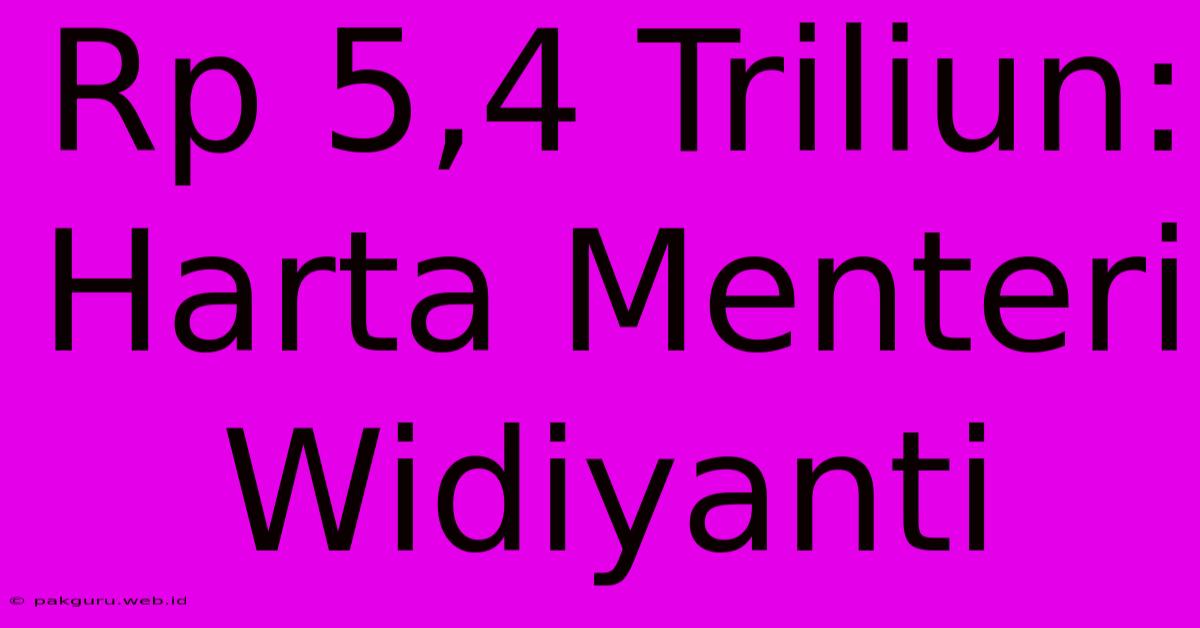Rp 5,4 Triliun: Harta Menteri Widiyanti

Discover more detailed and exciting information on our website. Click the link below to start your adventure: Visit Best Website wanagama.com. Don't miss out!
Table of Contents
Rp 5,4 Triliun: Harta Kekayaan Menteri Widiyanti - Sumber Kekayaan dan Kontroversi
Indonesia's political landscape often sparks public interest, particularly regarding the wealth of its public officials. Recently, the declared assets of Minister Widiyanti, totaling Rp 5,4 triliun, have ignited significant discussion and scrutiny. This article delves into the details surrounding this substantial wealth, exploring potential sources and addressing the ensuing controversies.
Understanding the Figure: Rp 5,4 Triliun
Rp 5,4 triliun (approximately US$360 million, subject to exchange rate fluctuations) is a staggering sum. It represents a significant portion of Indonesia's national budget and raises important questions about the origins and legitimacy of such wealth for a public servant. The figure itself necessitates a thorough examination of Minister Widiyanti's financial history and business dealings.
Sources of Wealth: Unpacking the Details
Unfortunately, publicly available information regarding the precise breakdown of Minister Widiyanti's Rp 5,4 triliun assets is often limited. Transparency in the declaration of assets is crucial for maintaining public trust. However, potential sources could include:
-
Business Ventures: Prior to her ministerial appointment, Minister Widiyanti may have been involved in successful business ventures, potentially in real estate, finance, or other lucrative sectors. A deeper investigation into her past business activities is necessary for a comprehensive understanding.
-
Family Inheritance: Inheritance from family members could also contribute to her considerable wealth. This is a legitimate source, but the specifics should be transparent to avoid any perception of impropriety.
-
Investments: Strategic and successful investments in stocks, bonds, or other assets can generate significant returns over time. The nature and extent of such investments would need to be clarified.
Controversy and Public Scrutiny:
The declaration of such a substantial amount of wealth inevitably attracts public scrutiny. Concerns regarding potential conflicts of interest and the ethical implications of such wealth for a public official are naturally raised. These concerns are not unique to Indonesia and are common in many countries with similar systems of public disclosure.
Addressing Transparency Concerns: The Need for Clarity
To alleviate public concerns and enhance transparency, it is essential that:
-
Detailed Asset Breakdown: A detailed breakdown of the Rp 5,4 triliun assets should be made publicly available. This should include specifics regarding property holdings, investments, and other assets.
-
Independent Audit: An independent audit of Minister Widiyanti's financial records would provide assurance to the public regarding the legitimacy and accuracy of the declared assets.
-
Strengthening Anti-Corruption Measures: Continued efforts to strengthen Indonesia's anti-corruption measures and promote good governance are paramount in maintaining public trust and accountability.
Conclusion: Maintaining Public Trust
The declaration of Rp 5,4 triliun in assets by Minister Widiyanti highlights the ongoing need for greater transparency and accountability within Indonesia's political system. While wealth accumulation is not inherently problematic, the scale of this figure demands a thorough and transparent explanation. Addressing these concerns through improved disclosure practices and strengthened anti-corruption efforts is crucial for maintaining public trust and ensuring the integrity of Indonesia's governance. Further investigations and public discourse are vital to fully understand the implications of this considerable wealth. This is crucial not just for Minister Widiyanti's case, but also for the future of transparent governance in Indonesia.

Thank you for visiting our website wich cover about Rp 5,4 Triliun: Harta Menteri Widiyanti. We hope the information provided has been useful to you. Feel free to contact us if you have any questions or need further assistance. See you next time and dont miss to bookmark.
Featured Posts
-
Live Streaming Bologna Vs Dortmund H2 H Lengkap
Jan 22, 2025
-
Dortmund Pecat Sahin Usai Kalah Dari Bologna
Jan 22, 2025
-
Widiyanti Putri Kekayaan Menteri Terbaru
Jan 22, 2025
-
Atalanta Vs Sturm Graz Susunan Pemain And Prediksi Skor
Jan 22, 2025
-
Bencana Batang 6 Jembatan Ambrol
Jan 22, 2025
